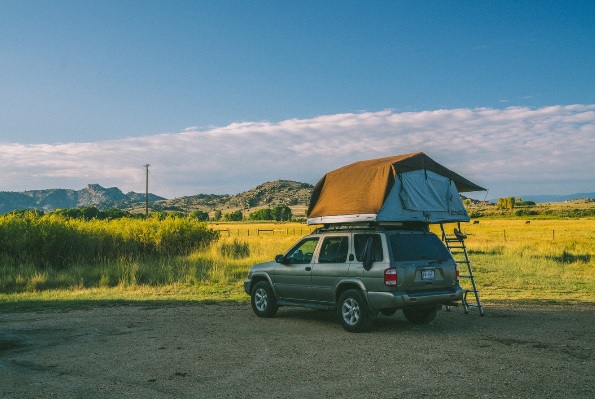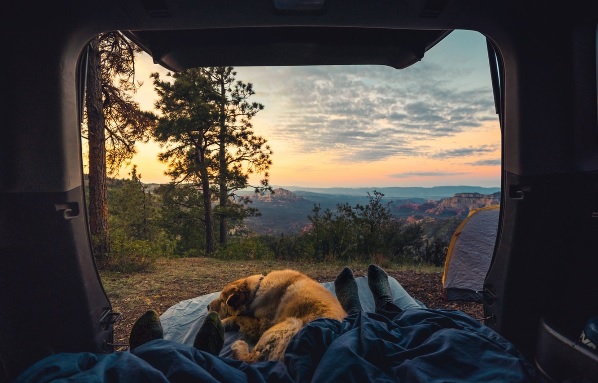Car Camping: Do Something Different
Category: article
Jan 14th, 2020 by Keith Worrall
Modified Jan 14th, 2020 at 3:41 PM
Car Camping: Do Something Different
After a long week of work, you get home on a Friday afternoon with a sense of adventure. You want to make the most out of your weekend, but at the same time you might be lacking energy to pack everything up and get away. Growing up, who hasn’t fallen asleep in the car? Combine your trusty vehicle and less camping equipment, and you’re on your way to experience all the benefits of camping, without the hassle of packing and extreme prepping. In this guide we will talk about everything you need for car camping and what it might entail. It might be a logical thinking pattern to bring a backup tent with, just in case something happens. An all-season tent is the best recommended choice because it’s suitable for all seasons, Camp4 covers this topic extensively.
Choosing Your Destination
Ok, so you’ve made your mind up, you’re ready to go car camping and experience the outdoors. Before you start packing determine where you want to go. This will result in what camp supplies you need and what you might expect to experience. For beginners, or those looking for a easier experience, campsites are your best friend. Campsites might need to be booked in advance, but not always depending on the time of the year. The benefits of campsites mean that it will be close to home and you’ll have all the essentials at hand. Most of these places come equipped with drinking water and bathrooms. Research if the campsite can be booked over the phone or online to avoid disappointment at the entrance. The benefits include packing less and if anything goes wrong, or you’re not having the best of times, you can easily make your way home again.
If it’s the true wilderness you seek, maybe state parks and forests might be up your alley. Unlike campsites, these forests and parks will be much more secluded and give you a better escape from society. There’s something beautiful and unique about being alone and taking nature in, forgetting about the stress of life and taking advantage of the full outdoors experience.
These parks and forests might have some drawbacks, you will need to pack more supplies like water and cooking supplies. You may also have to consider bathing in nearby rivers and having no access to public toilets. It will require a bit more effort than campsites, but the benefits far outweigh the shortcomings. Just be sure the land you’re about to venture on is public, and you’re not trespassing on private property. Also, if hunting is on your list make sure that you have all the necessary
tools and gear on hand.

Preparation and Packing
Hooray, you have found a place that fits your camping needs and you’re ready to go. Hold up, before you get in the car and rush off to your amazing adventure, make sure you have the following checklist covered.
1) Gas: This sounds like a no brainer but often we get so excited we forget to check the gas light. The worst time to run out of gas is if you’re stranded in an isolated place with limited reception. Make sure the car is fully functional too, oil checked, tyres pumped and battery reliable.
2) Water: We previously mentioned that if you’re visiting a campsite they may have access to clean water. But just as a precaution make sure you’re loaded with H2O.
Unlike normal camping and hiking you won’t need to worry about being weighed down with water bottles. You’re in your trusty vehicle and it can carry as muchwater
as you’re willing to drink.
3) Propane stove: Be sure to pack in a stove to cook your meals and make your early morning coffee. Some places do not allow fires, or there are fire places available butyou don’t want to wait in line. A propane gas stove offers a great alternative, it’s cheap, reliable and if it rains it much easier to get started than lighting a match.
4) Tent: When you think of car camping you probably think we meant only sleeping in your car itself. This isn’t always the case however, if energy and time permit pack in a little tent to pitch outside your car. If your vehicle isn’t particularly large and it won’t be a comfortable sleep inside, have your tent ready. You still gain the benefits of car camping with more packing space and having the vehicle as your go-to resource.
5) Sleeping gear: Depending on where you’ll be sleeping you might need a sleeping bag. If you’re prepared to sleep outside the car in a tent, make sure you have a
comfortable mattress to sleep on. Since we are using our car to camp you could replace your sleeping bag with a nice thick blanket and fold it up, and put it back in
the trunk the following morning. If you plan to sleep inside the car itself, a blanket will be just fine.
6) Different foods: Be prepared for anything, sometimes the camping site won’t go as planned. Maybe you don’t have a stove and you were going to rely on a campfire
only to find out its pouring with rain. Have canned foods ready or meals that require no heating. Sure it might not be as nice as a warm meal on a cold day, but at least
you won’t be hungry.
7) Toiletries: Yes you guessed it, toilet paper! Some campsites say they have toilets available, but this doesn’t mean they are fully stocked with TP. Be sure to bring your
own and prevent a scary situation where you see an empty toilet roll beside you.
8) First aid box: You’re going out into the wilderness or forest, where the ground isn’t level and sharp objects are in abundance. Mistakes do happen, and unequal footing can lead to a nasty ‘boo-boo.’ Have bandages and plasters ready for any cuts and bruises so you don’t have to head home if you hurt yourself.
Arriving at your destination

After all the packing is done and you’ve made it to your camping area there are some important things you need to do before you sit down and take in nature. Start off with getting your car ready. Be sure to turn the lights off inside your car permanently so the battery is conserved. You’ll probably be opening the doors a lot and you don’t want your car going flat.
Once your car is ready to be your primary base remember that’s its purpose. There’s no need to remove everything and set it up around your campsite. Keep as much things in the car and old remove what needs to be used. If you have a tent, set it up close to the car and keep it free of any unnecessary things, this means less packing up time when you leave.
After everything is in its appropriate position it’s time to get the fire or stove going. You’ll probably want to get food ready to set it up close to your sleeping area, but not too close where the smoke might potentially get into your clean clothes or sleeping area. Now that you have access a fireplace and a sleeping area, you’re ready to enjoy what the outdoors has to offer.
Final tips and departure
Always remember when you’re visiting the outdoors, the very reason we seek it is to get away from our everyday lives. It is no longer our home, and it belongs to animals and all sorts of creatures. Therefore you should always be weary to respect the environment and pick up your garbage. Leave nature as you found it and pick up any food packaging you have used. Forests and parks may allow campfires so keep a close lookout when starting one, and extinguish all fires before you leave.
Nature is wild, and it can be dangerous. For first time campers it’s often better to go in groups before venturing out alone. Anything can happen and if you don’t exactly know what the area holds, it’s better to stay with people who can help you if anything goes wrong. Finally, enjoy the experience and have fun! Car camping can be really exciting and a good introductory level to anyone wanting to try out the outdoors. You get to experience all of the benefits of camping, while having access to something close to home. It doesn’t mean you’re limited to your vehicle.
You could spend a few days close to your base, then venture out with just a tent. It’s definitely a good way to influence some friends to tag along, and get them into your lifestyle away from the congested city.
